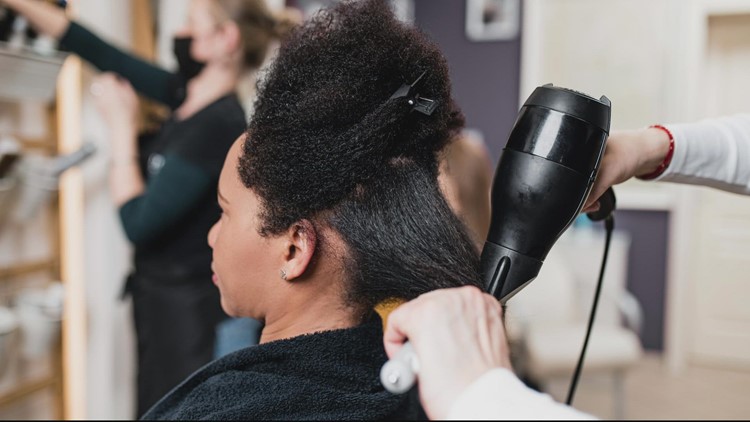ST. LOUIS — While its authors say more research is needed to confirm its findings, a National Institutes of Health (NIH) study has statistically found that women who frequently use hair straightening products have twice the chance to develop uterine cancer compared to women who do not use them.
The researchers also found Black women may be at an increased risk due to a higher usage rate of hair straightening products.
“Straighteners in particular have been found to include chemicals such as phthalates, parabens, cyclosiloxanes, [and] metals, and can release formaldehyde when heated,” Dr. Alexandria White, said in an interview with Medical News Today.
White, lead author of the study, is National Institute of Environmental Health Sciences (NIEHS) Environment and Cancer Epidemiology group director, which is a part of the NIH.
Uterine cancer, which is also called endometrial cancer, is the sixth most commonly occurring cancer. More than 417,000 cases were reported globally in 2020.
“Previous research has suggested that hair dye and chemical straighteners are related to other hormone-sensitive cancers, such as breast and ovarian cancer, but no previous study has considered how they are related to uterine cancer risk,” said White explained.
Researchers studied data 11 years from over 33,000 women in the United States aged 35–74 years who participated in the MIH “Sister Study,” an effort to identify breast cancer risk factors and other health issues.
During that time, 378 cases of uterine cancer were diagnosed.
Upon analysis, the scientists found that women who said they used hair straightening products more than four times in a year were more than twice as likely to develop uterine cancer than those who did not use the products.
“We estimated that 1.64% of women who never used hair straighteners would go on to develop uterine cancer by the age of 70; but for frequent users, that risk goes up to 4.05%,” White said.
Researchers reported not finding any increased risk for uterine cancer for women using other hair care products such as hair dyes, highlighting products, bleach, or perming products.
According to researchers, 60% of participants who used hair straightening products self-identified as Black women. Although scientists did not find a link between chemical hair straightener use, uterine cancer diagnosis, and race, the research team reported Black women may be at increased risk due to higher use of chemical hair straighteners.
“Because Black women use hair straightening or relaxer products more frequently and tend to initiate use at earlier ages than other races and ethnicities, these findings may be even more relevant for them,” said Dr. Che-Jung Chang, a research fellow in the NIEHS Epidemiology Branch and member of the study’s research team.
A study from June 2022 found that incidents of uterine cancer were on the rise among non-Hispanic Black women. This same study also found that Black women had more than double the mortality rate compared to other racial and ethnic groups.
“To our knowledge, this is the first epidemiologic study that examined the relationship between straightener use and uterine cancer,” White said.
“More research is needed to confirm these findings in different populations, to determine if hair products contribute to health disparities in uterine cancer, and to identify the specific chemicals that may be increasing the risk of cancers in women,” she cautions.
While White said it is too early to come to a definite conclusion, the NNPA Newswire is reporting that attorneys Ben Crump and Diandra Debrosse Zimmermann have filed a lawsuit against beauty products giant L’ Oréal USA.
The suit was filed on behalf of Jenny Mitchell, who the attorneys contend has no family history of cancer yet was diagnosed with uterine cancer after years of using L’ Oréal products.
“Black women have long been told they must use chemical hair straightening products to meet society’s standards,” Crump said in a statement.
“Companies took advantage of this and marketed their dangerous products to women without any regard for the serious health risks. We need justice.”
Crump said Mitchell started using the products around 2000 and continued until 2022.
“We have commenced this important litigation to seek and obtain justice for those women and their families,” Crump said.


